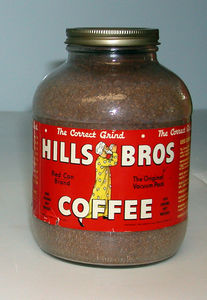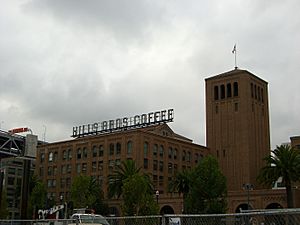Hills Bros. Coffee facts for kids

WWII-era jar of Hills Bros. coffee with the original "taster" logo
|
|
| Owner | Massimo Zanetti Beverage USA |
|---|---|
| Country | United States |
| Markets | Worldwide |
| Previous owners | Nestlé Sara Lee |
| Website | http://www.hillsbros.com |
Hills Bros. Coffee is a well-known company that makes and sells packaged coffee. It was started a long time ago in San Francisco, a city in California.
Contents
The Start of Hills Bros. Coffee
The story of Hills Bros. Coffee began with two brothers, Austin Herbert Hills and Reuben Wilmarth Hills I. Their father, Austin Hills, was a shipbuilder who built fast sailing ships called clippers in California.
New Ways to Pack Coffee
In 1900, Hills Bros. became famous for a new idea. They were the first company to pack roasted coffee in special vacuum-sealed cans. This helped keep the coffee fresh for much longer. The company officially became "Hills Bros." in 1906.
In 1926, Hills Bros. moved its main operations to a large, historic building in San Francisco. This building was so famous that the smell of coffee roasting there filled the air nearby! Today, parts of this building are used by companies like Google LLC and the Mozilla Corporation.
Changing Logos and Spokespeople
For many years, the company's logo showed an Arab person drinking coffee. This logo was created in 1898. In 1990, it was changed to a new "taster" image, which looked more like the company's original founders.
In the 1970s, Hills Bros. hired famous people to appear in their TV commercials. Singer Sergio Franchi helped introduce new coffee flavors. An actor named John Zaremba also played a coffee bean buyer in many commercials.
Expanding and Changing Owners
In 1930, Hills Bros. started to expand its business to other cities, like Chicago. During World War II, the company had to change from using metal coffee cans to glass jars because metal was needed for the war effort.
Over the years, Hills Bros. Coffee has been owned by different companies. In 1985, Nestlé bought Hills Bros. and another coffee company called MJB. Nestlé then opened a new coffee roasting plant in Virginia in 1988.
In 1997, the original Hills Bros. headquarters in San Francisco closed. The company's operations moved to Nestlé's main office in California. Later, in 1999, Nestlé sold Hills Bros. to Sara Lee.
Finally, in 2006, Massimo Zanetti Beverage USA bought the brand. This company is now in charge of Hills Bros. Coffee.
See also
- Grgich Hills Estate, a winery that has a connection to the Hills family
- MJB (coffee), another coffee brand that started in San Francisco
- Folgers, a well-known coffee brand also founded in San Francisco
 | George Robert Carruthers |
 | Patricia Bath |
 | Jan Ernst Matzeliger |
 | Alexander Miles |


